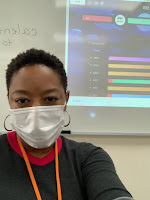Of late, I have been questioning the equity of service hour requirements and expectations. Are they fair? I've also been beating myself up a bit for failing to be a better example when it comes to serving in the community. Perhaps if I did more community service, and did it more consistently, then my daughter would see it as a natural part of our family's lifestyle and wouldn't be struggling to find time to earn hours.
I do consider myself a servant. I've been teaching high school for 13 years (after teaching middle school for 4 years). I teach in a public school where more than 35 percent of the student population receives services through the Free and Reduced Meals program. We teachers have no idea who receives these services, as that information is kept private. But as a result, we quietly assist students in countless ways outside of the job requirements. My daughters have witnessed this level of service -- from stocking a classroom cabinet with granola bars to slipping a student a dollar to catch the local bus after missing the school bus.
Outside of school, they've seen me do small acts of kindness, like hand a few dollars to a beggar and pick up trash in the neighborhood with my sorority sisters. Their dad has shoveled for the neighbors and makes regular drop-offs to the Goodwill. My point is that we are not a selfish family. No, we are not the community service rock stars like a few friends in our circle, but we do things for others.
I typically try to avoid comparing my two daughters. They are so different in so many ways. But on this topic of service requirements, the comparison is what has the question of fairness stuck in my head.
My older daughter, now a sophomore in college, got into the National Honor Society with relative ease. She had all three of the required tenets: scholarship, leadership and service. But I suspect the decision to admit my younger daughter was a bit more challenging. She had the grades and the leadership roles, but her service tasks were not as impressive as her sister's. (I am grateful to the school's selection committee for adapting with the changing times.) Ironically, my younger daughter is more apt than her sister to jump up and help others. She has a big heart, but that's not always quantifiable.
What were the differences between the two girls with regards to service hours? I see three significant ones.
First, and most obvious, was the pandemic. My older daughter's high school career ended in quarantine, but she had 3-1/2 years of traditional community service opportunities. My younger daughter was in high school for a little more than a semester when the COVID-19 outbreak shut down opportunities. She spent the rest of 9th grade and almost all of 10th grade attending classes from her bedroom. The child who had enjoyed ushering at church and tagging along at my sorority service events found herself struggling to stay "up" emotionally and socially. She did not have the energy or motivation to come up with creative ways to log community service hours from home. Many students did, and I truly applaud them. But my child was in survival mode. (Mom was, too!)
The COVID factor also influences the other differences I see between my two daughters' experiences with community service in high school. While both girls played soccer throughout high school, my younger daughter also ran track in both the winter and spring. The demands on her time and energy were considerably different. And quite frankly, after seeing my teen sulking in her room for months, I was most happy to see her outdoors, running around, getting exercise and socializing with teammates.
The third major difference has to do with money.
My older daughter worked during the summers, but never during the school year. She didn't want to, and mom and dad didn't want her to. My younger daughter, on the other hand, was adamant about getting a job. I suspect that after months and months of online shopping (hopefully not while she was supposed to be logged in for class), she wanted to be able to buy her own clothes, room decorations and knickknacks without having to ask.
I wasn't thrilled about the idea of her working during the school year either, especially with the commitment to two sports. But, again, I was open to almost any opportunity that got her out of her room. And, to be honest, now that we were paying college tuition, her paychecks lightened the financial load a bit. The money I had been transferring to her account, in an effort to lift her spirits, could now be diverted to bills and essentials.
This is where the question of equity comes in. At the moment, we don't require our daughters to contribute to household bills. I recognize that we are blessed and privileged in this way. But I think about the many families that must rely on their children's income to support the household. I see them at my school. During virtual learning, I had several students tell me they missed class because they had to work. During that time, one student in our building shared with a colleague that they were the sole breadwinner for the family. I'm confident that this expectation of high school students to contribute to their families' finances did not start with pandemic.
I intend to help my daughter work out a plan to get service hours this semester and summer. She needs to maintain her status in honor societies. And God knows we'll need some scholarships, so the service will bolster those applications, too. If necessary, she'll have to pass on a shift or two at work and commit some time.
I know that the importance of encouraging children to serve extends beyond honor societies and applications. Service is about helping others, not using it to position yourself for personal accolades.
Johnson, a fellow Syracuse University alumnus, encourages parents to lead by example. "You must model it before the next generation," he writes. "Show them how to give back."
I know I need to make some improvements in this area. Out of necessity, I've put work ahead of service. But I am also reminded of how we all can serve someone else in some capacity, even if that service is not easily documented. As the daughter of a storefront preacher in a poor city, I grew up in a household where service was the norm. We were poor, but we were always doing something for someone else. And, ironically, we never called it "community service." We never called it anything. We just did it!
It is my hope that admissions officers, scholarship selection committees, and others who must evaluate the community service efforts of others -- particularly teens -- will at least be mindful of the obstacles. If service hours are lacking, dig deeper. Don't blindly use the lack of documented service hours as a tool to preserve exclusivity among elite organizations.
💟 Comment below with your thoughts about community service. 💟 - What's your favorite service activity?
- Do you know of any cool community service opportunities for teens?


